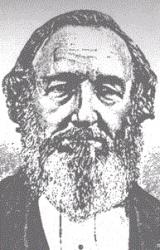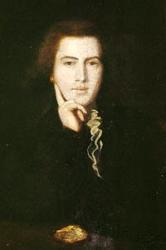
1812 - 1880 Person Name: Wm. Hauser Composer of "NORTH CAROLINA" in The Good Old Songs The Reverend Dr. William Clarke Hauser was a minister, medical doctor, teacher, composer, and music publisher. He was born December 23, 1812 in Bethania, Forsyth County, North Carolina, USA, and died September 15, 1880 in Wadley, Jefferson County, Georgia. He was the son of Martin Hauser and Leah Billiter.
William Hauser united with the Methodist Church in 1827 and was licensed to preach in 1834 and was a circuit riding preacher for two years. On March 23, 1837, he married Eliza M. Renshaw (1813-1880), and they had three children: Carolina Elizabeth Hauser Parker (1838-1926), William Clarke Hauser (1844-1919), and Victor McLandhton Hauser (1847-1919). William Hauser raised his family in New Orleans, LA and Victor Hauser did the same in Ogden, Utah. William Hauser attended Henry College in Virginia, beginning in 1839. After moving to Georgia in 1841, he began the study of medicine. He later taught at Oglethorpe Medical College in Savannah, GA.
Hauser made two significant contributions in the area of shape note music: (1) The Hesperian Harp: a Collection of Psalm and Hymn Tunes, Odes and Anthems, published in four shapes at Philadelphia by T. K. Collins, Jr. in 1848; and (2) Olive Leaf: A Collection of Beautiful Tunes, New and Old; the Whole of One or More Hymns Accompanying Each Tune, for the Glory of God, and the Good of Mankind, published in seven shapes at Wadley, Georgia, by Hauser and Benjamin Turner in 1878. The Hesperian Harp was probably the largest shape note tune book of its day, containing 552 pages of music, including 36 songs composed by Hauser. His Olive Leaf was produced in the seven shape notes of Jesse B. Aikin and contained only eight of his compositions from the older book. But his new compositions numbered forty-eight. The Moravian Music Foundation calls Dr. William Hauser "Appalachia's most significant contribution to American music."
Dr. Hauser died on September 18, 1880. His last words were ″I feel that my work on earth is done, and there is not a cloud between me and God.″ William and Eliza Hauser are buried on their plantation, Hesperia, near Wadley in Jefferson County, Georgia.
--en.wikipedia.org/wiki/
William Hauser

